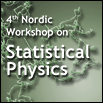Speaker
Prof.
Signe Kjelstrup
(Norwegian University of Science and Technology)
Description
We show that the kinetics of a molecular motor fuelled by
ATP and operating betweeen a deactivated and activated
state, can be derived from the principles of non-equilibrium
thermodynamics for the mesoscopic domain [1, 2]. As example
we study muscle contraction. The activation by ATP, the
possible slip of the motor, as well as the forward stepping
carrying a load, are viewed as slow diffusion along a
reaction coordinate. Local equilibrium is assumed in the
reaction coordinate spaces, making it possible to derive the
non-equilibrium thermodynamic description. Using this
scheme, we find non-linear expressions for the velocity of
the motor, in terms of the driving force along the spacial
coordinate, and in terms of the chemical potentials of the
reactants and products which maintain the cycle. The second
law efficiency is defined, and the velocity corresponding to
maximum power is obtained. Experimental results taken from
the literature [3], support the description, and give a
maximum efficiency near 0.6 at a muscle filament velocity of
5Å/ms. The formalism proposed can be applied to other
non-equilibrium activated processes, say of protein binding
or DNA stretching. It opens the possibility for detailed
molecular models, which may be needed to explain experiments.
References
[1] S. Kjelstrup, J.M. Rubi, D. Bedeaux, Phys. Chem. Chem.
Phys. 2005, 7, 4009.
[2] A. Lervik, D. Bedeaux, and S. Kjelstrup, Eur. Biophys.
J. 2012, 41, 437
[3] T. Førland, Biophys. J. 1985, 47, 665.

